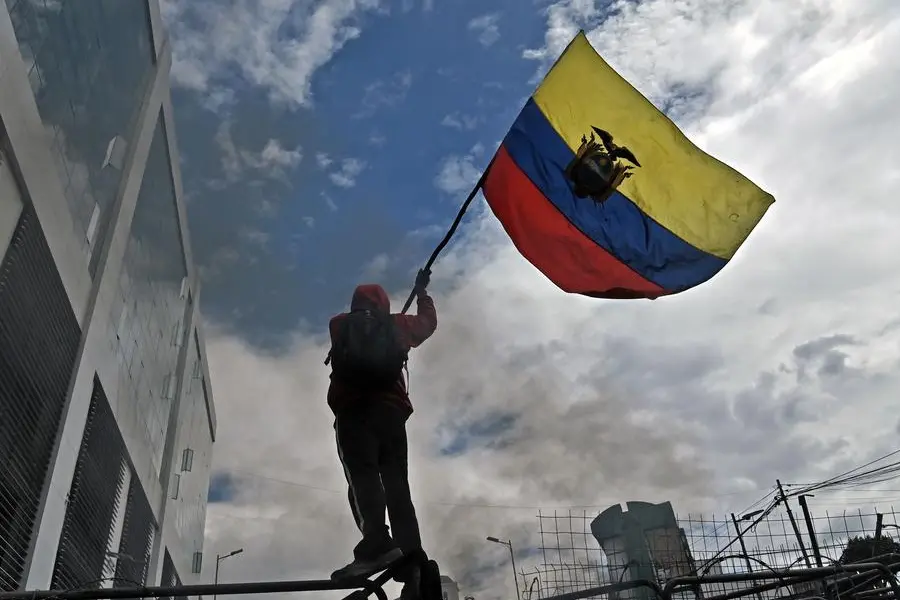PHOTO
Ecuador's spike in crime and drug trafficking has cast a dark shadow over its upcoming election, with presidential candidates vowing to crack down on lawlessness even as they campaign during a state of emergency.
Once a peaceful nation, wedged between major cocaine producers Colombia and Peru, Ecuador has in recent years become a nerve center for the global drug trade, leading to a boom in brutal gang violence.
This has transformed the electoral terrain as Ecuador prepares for a snap election on August 20 amid rising levels of insecurity.
A mayor and an aspiring lawmaker have been assassinated, a presidential candidate has faced threats, and the latest explosion in prison gang violence left about a dozen inmates brutally murdered last week.
"These elections are unusual due to the backdrop of intense anxiety stemming from organized crime," said Santiago Cahuasqui, a political scientist at the International SEK University.
President Guillermo Lasso, who took office in 2021, called the snap election after he dissolved the opposition-dominated Congress in May to avoid an impeachment trial.
He has said he will not seek re-election.
In a bid to crack down on violence, Lasso has declared multiple states of emergency.
Taking a page out of the playbook of El Salvador's President Nayib Bukele -- whose crackdown on alleged gangs has alarmed rights activists -- Lasso has shared images of partially unclothed inmates, bound and packed together, after law enforcement operations.
- 'Amplifying fear' -
The states of emergency have had "limited results," said security expert Carla Alvarez.
Highlighting the insecurity in the country, around 30 candidates, including six of the eight presidential candidates, are under police protection.
The assassination of mayor Agustin Intriago of the port of Manta in the Pacific coast province of Manabi last month further raised tensions.
Unsurprisingly, security is the main focus of all presidential contenders' election campaigns.
Their proposals vary from building a maximum security prison in the Amazon, to deploying signal jammers in prisons, better equipping police and soldiers, or imposing harsher penalties on criminals.
"This wave of violence provides the ideal breeding ground for security-oriented populism. Most candidates are endorsing a hardline strategy as the sole solution," said the security expert Alvarez.
The political scientist Cahuasqui noted that "the prevailing criminal context has led to the emergence of candidates championing positions that run counter to human rights."
He said an increasingly vulnerable and fearful population had led to "the proliferation of extremist stances" without any substantial proposals.
Politicians are "resorting instead to amplifying fear, mistrust, and danger.
- 'Exponential' rise in violence -
According to a recent survey by pollster Cedatos, attorney Luisa Gonzalez, the only woman candidate, who is aligned with former socialist president Rafael Correa, is the frontrunner.
Other leading candidates include centrist journalist Fernando Villavicencio, leftist Indigenous attorney Yaku Perez, and right-wing former vice president Otto Sonnenholzner.
Villavicencio said Tuesday he and his team had been threatened by the leader of a gang linked to drug trafficking.
According to the Cedatos poll, 38 percent of Ecuadorians exhibited "concern" and a "pessimistic" outlook on the situation in the country.
Eleven percent of those polled want the presidential candidates to show a "willingness to combat criminality."
Alvarez said "the escalation of violence has not occurred linearly, but rather exponentially" in Ecuador, a country with a population of 18.3 million.
In 2022, the murder rate almost doubled compared to the previous year to 25 per 100,000, a figure experts say will increase to 40 this year.
The country has seized about 530 tons of narcotics since 2021, according to official figures. Prison violence between gangs has left more than 430 dead in the same period, according to an AFP count.





















